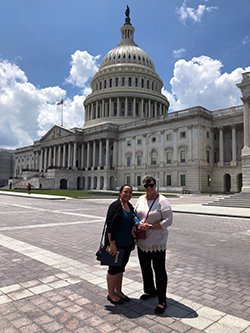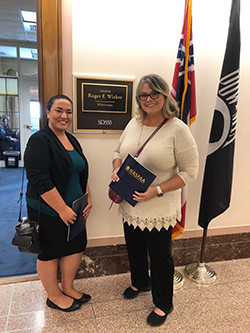NASFAA Members Take to Capitol Hill to Advocate for Increased Federal Work-Study Flexibility and Tools to Curb Student Indebtedness
By Maylene Rodriguez Scott, 2019 DME Policy Intern
Last Thursday, NASFAA members from Utah and Mississippi institutions met with congressional staff members on Capitol Hill to express their support for increased Federal Work-Study (FWS) flexibility, the restructuring of the campus-based aid allocation formula, and greater provision of tools for financial aid offices to curb student loan indebtedness.
The members—Debbi Braswell of Belhaven University and Ashley Stevenson of Utah Valley University (UVU)—met with staffers from several congressional offices, including those on the Senate Health, Education, Labor, and Pensions (HELP) Committee and the House Appropriations Committee.
 An overarching theme that surfaced was an expressed desire for greater institutional flexibility. As Braswell and Stevenson met with staffers, they highlighted the complexity of FWS requirements when it came to employing students in the private sector and in community service work. They pointed out that having a "one-size-fits-all" approach to FWS positions may limit an institution's ability to allocate work-study funds in a manner that appropriately reflects their students' needs and available job opportunities.
An overarching theme that surfaced was an expressed desire for greater institutional flexibility. As Braswell and Stevenson met with staffers, they highlighted the complexity of FWS requirements when it came to employing students in the private sector and in community service work. They pointed out that having a "one-size-fits-all" approach to FWS positions may limit an institution's ability to allocate work-study funds in a manner that appropriately reflects their students' needs and available job opportunities.
Echoing NASFAA's Higher Education Act (HEA) reauthorization priorities, these conversations brought attention to the fact that schools are located in a variety of geographic regions and may attract students in specific fields due to their academic programs, thus some FWS requirements may conflict with available job opportunities and students' career paths. Braswell explained that if there is a shortage of community service jobs available for Belhaven University students, this may inadvertently result in the reduction of FWS expenditures to comply with the requirement that at least 7% of FWS funds be used for community service positions. Furthermore, Braswell emphasized the need to have greater flexibility to place her work-study students in career-oriented positions.
Stevenson drew on her experience as a Federal Work-Study Program Coordinator to highlight the limitations of the current FWS allocation formula. "This is important to me," Stevenson said, "because at Utah Valley University our enrollment has dramatically increased in the past 10 years."
Today, a primary component of the FWS allocation is the "base guarantee," determined by an institution's fiscal year 1999 FWS funding level, this means that FWS funding can be limited in its ability to respond to recent changes within an institution. Stevenson pointed out that when UVU made a shift from a state college to a university, they saw an influx in their student enrollment. Of the 39,000 students at UVU, roughly 300 students were actively participating in the FWS program.
"At UVU our slogan for our work-study employees is to 'Give Them More Than Just a Paycheck,' where students are able to gain great experience while working and going to school," Stevenson said. "We provide them with workshops through our human resources department to help them brand themselves better so they are fully equipped to go into the job force once they are graduated. I have seen how valuable the work-study program is to many students, and I only want to see it grow from here."
In response to financial aid administrators' concerns over the FWS allocation formula, NASFAA published a task force report on campus-based aid allocation which recommended to phase-out the base-guarantee and move to a fully "fair share" formula over the course of 10 years.
 Continuing on the topic of increased flexibility, both Braswell and Stevenson expressed support for financial aid offices to have the authority to set institutional-level loan limits and require additional loan counseling. Financial aid offices would be able to make blanket federal loan limits (e.g. a lower loan cap for part-time students) while still maintaining professional judgment to review appeals for increased loan amounts on a case-by-case basis. This may be particularly useful for schools with relatively low tuition so that they can counsel students who may not need the full annual loan amounts to cover their bill, thus reducing the number of students who unintentionally meet their loan aggregate prior to obtaining their desired college credential, Braswell and Stevenson said.
Continuing on the topic of increased flexibility, both Braswell and Stevenson expressed support for financial aid offices to have the authority to set institutional-level loan limits and require additional loan counseling. Financial aid offices would be able to make blanket federal loan limits (e.g. a lower loan cap for part-time students) while still maintaining professional judgment to review appeals for increased loan amounts on a case-by-case basis. This may be particularly useful for schools with relatively low tuition so that they can counsel students who may not need the full annual loan amounts to cover their bill, thus reducing the number of students who unintentionally meet their loan aggregate prior to obtaining their desired college credential, Braswell and Stevenson said.
When reflecting on her time in Washington, D.C., Stevenson said the experience was meaningful and beneficial to her position as a FWS program coordinator, adding that the trip was an "eye-opening experience."
"I think it's important to address the issues from the people ‘on the ground.' We see these students every day and try to help them best navigate their collegiate career," Stevenson said "However, sometimes policies that are put in place can be road blocks for some students and keep them from graduating. Making senators and representatives more aware of these roadblocks and how it affects these students on a daily basis is important so changes can be made."
After working in financial aid for almost 10 years, Stevenson said she enjoyed seeing the other side of "how the policies are put into place and how they pass through Congress and then trickle down to the institutions and then to the students."
"I think it's important to see all facets of federal financial aid so we can gain a better understanding of how we can help our students," she said.
Braswell also highlighted the importance of advocacy work for the financial aid profession, saying the opportunity "speaks to the basic framework upon with our legislative system is built."
"While Congress as a whole is representative of the diversity of our nation, when presented with specific real-life consequences of their well-intended legislation upon not only students, but also the diversity of institutions across the country, it can be a revelation of purpose; a purpose to allow for a broader sharing of the responsibility of good stewardship and accountability," she said. "Through this diversity of administrators, our congressional leaders hear that we are not all the same."
"I would like to believe that our leaders appreciate hearing that the administrators of the policies derived from their legislation are as passionate about and as focused on providing the best for our students as they are," she added. "Mutual goals lead to a greater sense of trust and understanding that can only enhance the full educational system of America. Hearing that the nation's administrators share their goals builds a strong sense of teamwork for progress. ... While we were diverse in our representation, we were unified in our goals and therefore, we were heard."
Publication Date: 6/11/2019






You must be logged in to comment on this page.